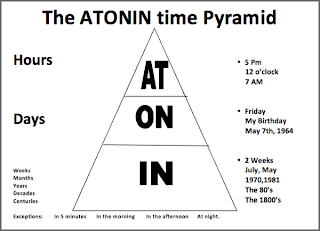PREPOSITIONS OF PLACE
| 1 ) AT - IN - ON | |
| General Information: | |
| AT | ON |
| We use at for a point: | We use on for a surface: |
| at the window - at the entrance - at the door | on the wall - on the ceiling - on the floor - on a page |
| at the end of the street - at the station - at the top | on a cover |
| Bill is waiting for you at the bus stop. | Have you seen the notice on the notice board? |
| IN | |
| We use in for an enclosed space: | |
| in the garden - in the house - in London - in the water | |
| in her bag - in a row - in a town | |
| There is nobody in the room. She lives in a small village. | |
| Special Information: | |
| AT | |
| 1. We say that someone is at anevent: | 2. We say at with buildings when we say where the event (film, concert,...) takes place: |
| at a party - at a pop concert - at a conference - at a meeting | Where were you yesterday? At the cinema. |
| Tom is at a party. | The meeting took place at the headquarters. |
| 3. We say at someone's house: | 4. We say at for a place which is a part of our journey: |
| We were at Bill's house last Thursday. | We stopped at a very nice village. Does the train stop at Nashville? |
| ON | |
| 1. We use on with small islands: | 2. We say that a place is on the coast / on a river / on a road: |
| She spent her holiday on a small island. | London is on the river Thames. |
| Portsmouth is on the south coast of England. | |
| IN | |
| 1. We say in when we talk about a building itself. | 2. We usually say in with towns and villages: |
| The rooms of Tom's house are small. | His parents live in York. |
Note these expressions:
| |
| AT | |
| at home - at work - at school - at university - at college - at the station - at an airport - at the seaside - at sea (on a voyage) - at reception - at the corner of a street - at the back / front of a building / cinema / group of people, etc. - arrive at with other places or events | |
| IN | |
| in the newspaper - in bed - in hospital - in prison - in the street - in the sky - in an armchair (sit) - in a photograph - in a picture - in a mirror - in the corner of a room - in the back / front of a car - arrive in a country or town | |
| ON | |
| on a farm - on the left - on the right - on the ground floor - on the first, second,... floor - on the way - on the chair (sit) - on the radio - on television - on a horse - on the corner of a street - on the back / front of a letter / piece of paper etc. | |
| 2) TO - INTO - BY | |
| TO | INTO |
| We say go / come / travel / fly / walk / return / drive / have been etc. to a place or event: | We say go into / come into etc. =enter a room / building etc.: |
| Last year we flew to London. We went to work at seven. | He opened the door and went into the room. |
| BY | |
| We say by to say how we travel: | |
| We went to Paris by plane. I usually go to work by bike / by car / by underground / by bus | |
| BUT: | |
| we say on foot | |
| we cannot use by if you say my car / the train / a taxi | |
| Then use in for taxis and cars. | |
| Then use on for bike / public transport. | |
| http://www.english-4u.de/prep_of_place.htm | |














